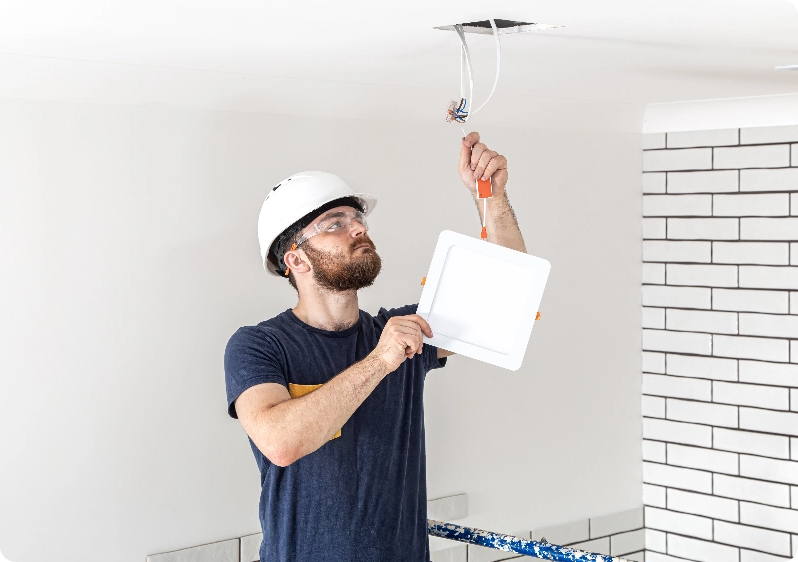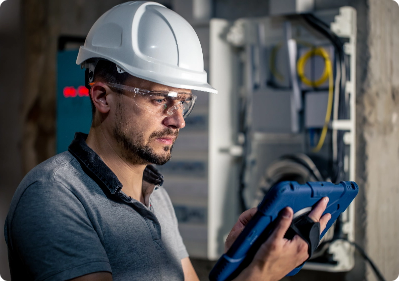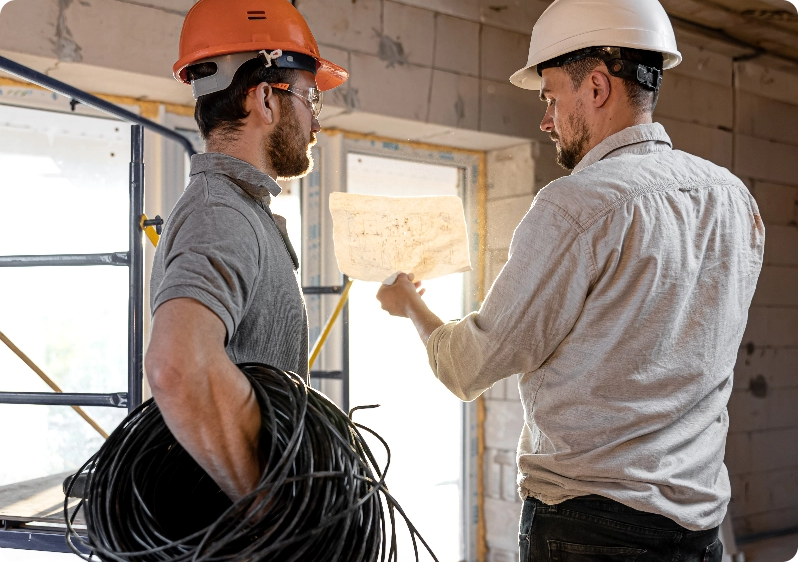11 JULY 2025
7 MIN
READ
What does an electrician do?
Electricians are skilled tradespeople who specialise in the installation, maintenance, and repair of electrical systems and equipment. They often work across different areas of electrical work, to ensure safety and efficiency in various settings.
Their primary responsibilities include:
Installation
Setting up electrical systems and components in homes, businesses, and other facilities.
Repair
Troubleshooting and fixing electrical issues to repair functionality.
Maintenance
Carry out regular checks and services to ensure electrical systems operate safely and efficiently.
Compliance
Ensuring that all work adheres to local and national electrical codes and regulations.
Safety
Prioritising safety by following protocols and using appropriate protective equipment.
Planning
Reading blueprints and technical diagrams to effectively plan installations and upgrades.
Why become an electrician?
Thinking about becoming an electrician? Here’s a few reasons why many people decide to take the leap.
With high demand for electricians, there is strong job stability and growth opportunities within the UK. From residential homes to commercial properties, you’ll work on diverse projects, keeping things interesting! And if you choose to go self-employed or start your own company, there’s potential to earn a competitive wage while lighting up your career on your own terms. Plus, once you have your core skills and qualifications, you’re able to move across different areas within the industry!
Interested? Let’s dive in!
Types of electricians
Choosing the right path that’s right for you can be exciting - here’s a quick look at the different types of electricians to help you find your spark!
Domestic Electrician:
Specialises in installing and maintaining electrical systems in homes and residential buildings.
Installation Electrician:
Focuses on installing electrical systems in residential, commercial, and industrial settings during new constructions or renovations.
Maintenance Electrician:
Responsible for the upkeep and repair of electrical systems, troubleshooting issues, and ensuring safety in various environments.
Electrotechnical Panel Electrician:
Specialises in assembling and maintaining electrical control panels and switchgear for proper system functionality.
Instrumentation Electrician:
Installs and maintains instruments and control systems in industries, ensuring accurate measurement and control.
Highway Electrical Systems Electrician:
Focuses on installing and maintaining electrical systems for roadways, including traffic signals and street lighting.
Skills you need to become an electrician in the UK
The types of skills you’ll need may vary depending on the type of electrician you want to become. However, as a starting point, there are some essential skills that will help you get started:

Physical skills
Ability to:
- Investigate signs of damage or malfunction
- Work from heights
- Visually inspect and identify wires and components

Interpersonal Skills
- Friendly and approachable demeanor
- Ability to build client relationships
- Teamwork and collaboration
- Strong communication skills

Organisational Skills
- Time management
- Budgeting
- Record keeping
- Negotiating
- Administrative skills

Knowledge
- Technical knowledge
- Understanding safety procedures and protocols
- Proficiency with tools
- Math skills
How to become an electrician
Now that you know the types of electrician and skills you’ll need, it’s worth considering which pathway to become an electrician would suit you best.
Routes to entry
College courses provide foundational knowledge in electrical theory and safety practices. These courses typically cover essential topics such as wiring, circuit design, and electrical systems, giving you a solid understanding of how electrical systems work - you'll also be able to practice your skills in a controlled environment! Many colleges offer courses that lead to industry-recognised qualifications.
Apprenticeships let you learn on the job alongside experienced electricians, earning a wage while gaining practical skills. If you choose this route, you’ll work in various settings and gain hands-on experience. Through your training, it’s also likely you’ll have the chance to earn industry recognised qualifications.
By enrolling in a vocational or technical school, you’ll have access to electrical training programs. These programs provide the foundation knowledge you need to get started, as well as practical experience. Some programs offer certificates, while others may provide associate degrees.
What qualifications do I need to become an electrician in the UK?
How long does it take to become an electrician?
There’s no set timeframe for becoming an electrician - it really depends on which route you take to gain experience and qualifications.
College or further education: This typically takes about 4 years if you're completing it in the traditional manner.
Apprenticeship: Completing an apprenticeship typically takes about 4 to 5 years.
Vocational training: If you attend a vocational or technical school, this can take anywhere from a few months to 2 years, depending on the program you choose.
What is an electrician’s salary in the UK?
There’s not a ‘one size fits all’ answer to how much you would earn as an electrician in the UK, as it depends on several factors. However, as a guide, recent data from National Careers Service reports that electricians in the UK can expect to make between £30,000 to £50,000 per year.
Self-employed electricians or those who run their own businesses in this industry are reported to earn significantly more, with top earners bringing in up to £60,000.
Additionally, those with experience and who go on to specialise in a particular field are likely to earn more.
Becoming a self-employed electrician
Legal considerations
Deciding what kind of business you want to run is a big step that affects everything you do, including the legal structure of your business.

Sole-trader/ self-employed
As a sole trader, you’re essentially your own boss and the only owner of your business. This means there’s no legal separation between you and your business, so you take on all the responsibilities and liabilities.

Limited company
On the other hand, a limited company is its own legal entity, separate from you as the owner. Whether you’re a one-person operation or have a team, forming a limited company allows you to act as its director.
Learn more about what these difference could mean for your business with AXA’s guide to different company structures: Sole trader or limited company?
You must register as self-employed
You need to inform HMRC once you become self-employed. It’s crucial that you give HMRC a heads up that you’ll be paying tax through Self-Assessment and Class 2 and 4 National Insurance rather than PAYE.
Need help get registered? Our handy guide can help.
Governance and compliance
Whichever path you choose to gain experience and qualifications as an electrician, it’s important to register with the right governing body once you finish your training. This not only confirms your credentials but also helps ensure you follow industry standards and regulations. In the UK, different regions have their own governing bodies for electricians.
Registering within the UK
If you’re in Scotland, you’ll want to register with the Scottish Joint Industry Board (SJIB). In Wales, the same organisations typically apply, along with local regulatory bodies focused on electrical safety. In England, you might register with organisations like the National Inspection Council for Electrical Installation Contracting (NICEIC) or the Electrical Contractors’ Association (ECA).
How to get customers as an electrician
Starting out in a new career can be tough, particularly when it comes to attracting customers. And being your own boss means the responsibility falls on you - it's essential to wire up a strong strategy to reach potential clients!
Here’s a few ways you can try and reach new clients:
Think about the last time you tried a new product that you loved, or even received stand out service – you probably told your friends about it! The same applies with your business. When clients are thrilled with your service, they’re likely to recommend you to their own network, creating customer referrals.
Online reviews are a great way to attract new customers. And as a small business, potential customers will be keen to hear from other clients who have successfully used your services. Why not ask clients to leave positive feedback on platforms like Google and Yelp?
Your online presence is often the first impression you make on potential customers – so make sure you make a good one! Consider having a professional website to promote your electrical services and make use of social media to share your work and engage with potential clients.
Delivering high-quality work and exceptional customer service is key in the electrical industry. Clients want to know they are putting their trust in the right people, and by being reliable and consistent with your work, you’ll be able to build a strong reputation.
Ready to become an electrician?
Starting a career as an electrician can be rewarding, but it also comes with a range of responsibilities that you’ll need to manage. Whether you choose to focus on residential, commercial, or industrial electrical work, your role will involve ensuring the safety and functionality of electrical systems, which is crucial for your clients’ peace of mind. With so much at stake, it’s important to protect yourself and your business against any unforeseen challenges that may arise.
Do I need business insurance as an electrician?
From protecting your tools and equipment to covering liability in case of accidents, having business insurance can help you focus on what you do best without worrying about potential setbacks. So, if you’re ready to take the next step in your electrical career, now is a good time to learn more about the types of business insurance that will help keep you and your responsibilities well protected.
What insurance do electricians need?
Electricians' insurance often combines several different covers to give a business insurance policy that suits your needs. Typically, these policies will vary depending on the type of work you do and the size of your business.
Public Liability Insurance
Public Liability Insurance protects your business in case someone is accidentally injured because of work you’ve carried out, like a slip or trip at the site you’re working at. This insurance can cover legal costs and protect you against claims.
Employers’ Liability Insurance
Protect your employees if they’re injured or become ill as a result of working for your business with Employers’ Liability Insurance. If you have staff, you’re legally required to have it. It’ll cover damages, compensation costs and legal fees if an employee/ex-employee is successful in making a claim against you.
Tools and Equipment Insurance
As a tradesperson, your tools are a big investment. Tools and Equipment Insurance is specifically designed for tradespeople like electricians. This insurance covers the cost of repairing or replacing your tools and equipment if they are lost, stolen, or damaged. This cover can be essential for electricians, as your tools are vital to your work and can often build up over time as an investment.
Professional Indemnity Insurance
This insurance can help cover legal costs and protect you in case of any claims made against you. Professional Indemnity Insurance is particularly important for electricians that provide consultancy services.
Ready to become an electrician?
As an electrician, you’ll be working hard to wire up your business, and that’s something worth protecting. Get started with AXA’s business insurance for electricians.
All links are checked and valid at time of publishing, 11 July 2025.
